Athletes will be competing in 98 events covering 15 sports over 18 days at these Winter Olympics. But, even though I shall be very indiscriminate in my viewing (on TV and the Internet), I shall be very discriminating in my commenting. I’m sorry if you’re interested in my thoughts on Curling; never mind that it’s one of my favorite “sports” to watch.
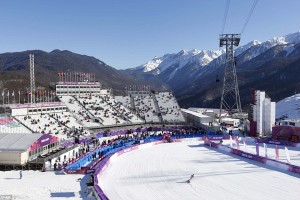 Before I get to it, though, I have a gripe about something that is becoming as much a staple at Olympic Games as the Opening Ceremony.
Before I get to it, though, I have a gripe about something that is becoming as much a staple at Olympic Games as the Opening Ceremony.
I find it more than a little difficult to reconcile all of the Chinese hype about these Olympic Games being such a source of national pride with all of the empty seats at so many events.
(“Beijing Olympics,” The iPINIONS Journal, August 15, 2008)
Sure enough, the first day of competition in Sochi makes clear that we’re going to be treated to the dispiriting eyesore of empty seats here too. To be fair, Western media have done all they possibly could to scare away spectators with their hysterical reporting on potential terrorist attacks.
Still, you’d think the Russians would have learned from the Chinese, or heeded my advice:
Again, it’s not as if the London organizers were not aware that this might be the case. It boggles the mind, therefore, that they did not enlist tens of thousands of volunteers (from pensioners to school kids) to show up at a moment’s notice to fill seats if ticket holders do not show up. They could have warned in print on all tickets that the holder forfeits the seat if it is not occupied by [45] minutes before the scheduled start of the event.
(“London Olympics: Day 1,” The iPINIONS Journal, July 28, 2012)
I give up.
Men’s Slopestyle
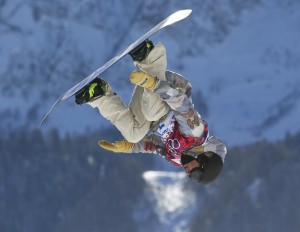 This is just one of 12 events making their debut at these Winter Games. I’m not even going to try to explain any of them, especially given that this would require making sense of terms like jibs, backsides, fakies, and corks. And, frankly, some of them smack of the IOC gilding the lily. I mean, do we really need a Figure Skating Team event, or the absurd redundancy of Slopestyle on snowboards and skis? What’s next, Downhill on snowboards in addition to skis?
This is just one of 12 events making their debut at these Winter Games. I’m not even going to try to explain any of them, especially given that this would require making sense of terms like jibs, backsides, fakies, and corks. And, frankly, some of them smack of the IOC gilding the lily. I mean, do we really need a Figure Skating Team event, or the absurd redundancy of Slopestyle on snowboards and skis? What’s next, Downhill on snowboards in addition to skis?
Anyway, suffice it to know that Slopestyle is rather like performing trampoline-like acrobatics while going downhill on snowboards or skis. And this gives only a sense of the daring and skill involved in this sport.
Indeed, as I indicated in my February 5 commentary below, it speaks volumes that Shaun White, who won gold in the death-defying Halfpipe debut at the Vancouver Games four years ago, withdrew from this event because he was afraid of getting hurt.
I watched every run, and was as riveted and awestruck as I am every time I watch Cirque du Soleil performers. Except that these kids are performing high-wire acts without the wires and safety nets. But if you thought figuring out the judging in pseudo-events like Ice Dancing was inscrutable, good luck with Slopestyle.
That said, I was pleased that Sage Kotsenburg of the United States won the first gold medal of these Games (take that Ruskies!). He claimed his holy grail by pulling off his signature trick, the “Holy Crail,” flawlessly. Staale Sandbech of Norway won silver; and Mark Morris of Canada, bronze.
Men’s Biathlon 10k Sprint
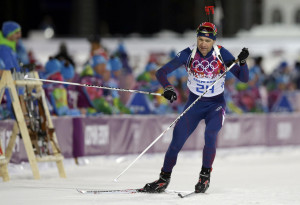 This, for many, might seem a strange event, combining as it does cross-country skiing and rifle shooting. But I actually found it even more entertaining than Slopestyle. Perhaps this is because the grit involved in cross-country skiing and the skill involved in rifle shooting are so clear for all to see … and judge.
This, for many, might seem a strange event, combining as it does cross-country skiing and rifle shooting. But I actually found it even more entertaining than Slopestyle. Perhaps this is because the grit involved in cross-country skiing and the skill involved in rifle shooting are so clear for all to see … and judge.
Granted, I might be a little biased because 40-year-old Ole Einar Bjoerndalen of Norway dominated many athletes half his age to become the oldest individual gold medalist in Winter Olympics history.
‘I always forget that (I’m 40). I feel like I’m 20. My age is perfect,’ Bjoerndalen said. ‘I am in super form. I prepared well for this and I am feeling strong.’
(Associated Press, February 8, 2014)
Let’s hear it for the … middle-aged men! Bjoerndalen is now entering Phelpsian territory with his 12th-career Olympic medal, including seven gold, and he stands to earn more at these Games.
Dominik Landertinger of Austria won silver; and Jaroslav Soukup of the Czech Republic, bronze.
Women’s Moguls
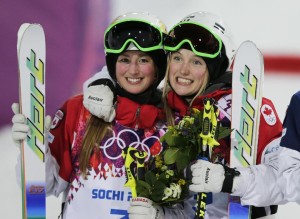 Truth be told, the only reason I’m commenting is that I was so impressed with the pre-Games profile NBC ran on the three Canadian sisters competing in this event. I was even more so when youngest sister Justine Dufour-Lapointe and middle sister Chloe won gold and silver, respectively. But then I thought how awful it must be for their oldest sister Maxine, who finished 12th. I suppose it would’ve been too much for them to sweep.
Truth be told, the only reason I’m commenting is that I was so impressed with the pre-Games profile NBC ran on the three Canadian sisters competing in this event. I was even more so when youngest sister Justine Dufour-Lapointe and middle sister Chloe won gold and silver, respectively. But then I thought how awful it must be for their oldest sister Maxine, who finished 12th. I suppose it would’ve been too much for them to sweep.
Hannah Kearney of the United States, the heavily favored defending Olympic champion, won bronze.
Men’s 5000 Speedskating
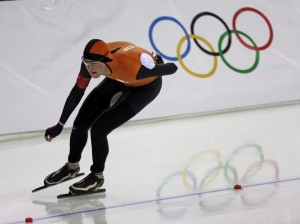 One of the most dramatic and heartbreaking moments of the 2010 Vancouver Games was watching the “flying Dutchman,” Sven Kramer, win the 10,000, only to then be disqualified because his coach directed him to make an illegal lane crossover during the race.
One of the most dramatic and heartbreaking moments of the 2010 Vancouver Games was watching the “flying Dutchman,” Sven Kramer, win the 10,000, only to then be disqualified because his coach directed him to make an illegal lane crossover during the race.
Nobody was surprised when he defended his gold medal in the 5000 today. In fact, he led a Netherlands sweep, with teammates Jan Blokhuijsen and Jorrit Bergsma taking silver and bronze, respectively.
Now all of the Netherlands, and fans of Speedskating worldwide, wait with bated breath to see if he can avenge that disqualification in the 10,000. I’m betting he will.
NOTE: Much is being made of Russia getting shut out of medals on Day 1. But I recall much the same being made of host country Canada being shut out in the early days of the 2010 Vancouver Games. Yet Canada ended up third in the overall medal count (with 26) and first in the number of gold won (14). Therefore, the United States, Ukraine, and EU countries would be well advised to hold their schadenfreude in abeyance….
MEDAL COUNT
Norway: 4; Canada: 3; Netherlands: 3